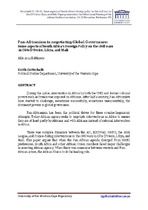| dc.contributor.author | Gottschalk, Keith | |
| dc.date.accessioned | 2014-12-12T11:51:49Z | |
| dc.date.available | 2014-12-12T11:51:49Z | |
| dc.date.issued | 2013 | |
| dc.identifier.citation | Gottshalk, K. (2013). Some aspects of South Africa’s foreign policy on the civil wars in Côte D’Ivoire, Libya, and Mali. Paper presented at the 56th Annual Meeting of the African Studies Association, 21-23 November, Baltimore, MD | en_US |
| dc.identifier.uri | http://hdl.handle.net/10566/1321 | |
| dc.description.abstract | During the 1960s, intervention in Africa by both the UNO and former colonial powers such as France was imposed on Africans. After half a century, Pan-Africanists have started to challenge, sometimes successfully, sometimes unsuccessfully, the dominant powers in global governance. Pan-Africanism has been the political driver for these counter-hegemonic attempts. Today African agency seeks to negotiate interventions in Africa to ensure they are at least partly by Africans and with Africans instead of external intervention in Africa. There was complex dynamics between the AU, ECOWAS, NATO, the Arab League, and France during interventions in the civil wars in Côte D’Ivoire, Libya, and Mali. This paper argues that when the Pan-African agenda diverged from NATO preferences, South Africa and other African Union members faced major challenges in asserting African agency. When there was consensus between western and Pan-African actors, the African Union took the leading role. | en_US |
| dc.language.iso | en | en_US |
| dc.rights | Copyright UWC. This work is licensed under a Creative Commons Attribution 4.0 International License. | |
| dc.subject | Foreign policy | en_US |
| dc.subject | African Union | |
| dc.subject | Côte D’Ivoire | |
| dc.subject | Mali | |
| dc.subject | Libya | |
| dc.subject | South Africa | |
| dc.title | Some aspects of South Africa’s foreign policy on the civil wars in Côte D’Ivoire, Libya, and Mali | en_US |
| dc.type | Conference Paper | en_US |
| dc.privacy.showsubmitter | false | |
| dc.status.ispeerreviewed | true | |

